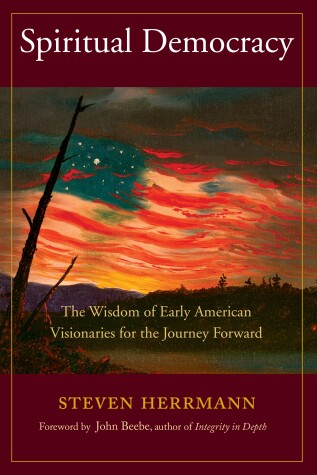Sacred Activism
1 primary work
Book 8
Exploring what the author calls the "shaman-poets"—Walt Whitman, Herman Melville, and Emily Dickinson—this book demonstrates how far ahead of their times these writers were in forecasting developments of our current time. It was Whitman who first wrote of "Spiritual Democracy" as a vision of transformation and global equality. Steven Herrmann delves deep into the visionary expressions of this idea of Spiritual Democracy—"the realization of the oneness of humanity with the universe and all its forces"—in these early American writers, showing the influence the groundbreaking work of the geologist and thinker Alexander Von Humboldt had on Whitman and others. Writing that every member of the global community regardless of color, gender, or sexual orientation can realize these freedoms, the author explores how one can tap into the vitalizing source of equalizing, vocational energy to bring a sense of purpose and peace. Although the book shines as a work of literary criticism, the author's insights as a Jungian psychotherapist take the reader ever deeper into the creative impulses of Whitman, Melville, Dickinson, and other poets in their crafting of the seminal notion of Spiritual Democracy. In addition, Herrmann offers practical methodologies for personal and global transformation in the section, "Ten Ways to Practice Spiritual Democracy."
Table of Contents
Visions of Spiritual Democracy - Introduction
1. Cosmos
2. Spiritual Democracy as a Science of God
3. From Humboldt to Jung
4. Jung on Spiritual Democracy
5. Healing the National Complex
6. Whitman's "New Bible": The Foundation of a Religious Vision
7. Walt Whitman's Global Vision
8. The Bi-Erotic as Transcendent Sexuality
9. Shamanism and Spiritual Democracy: A Post-Humboldtian Notion of the Cosmos
10. Whitman as a Preserver of the Psychic Integrity of the Community
11. Moby Dick: The Evolution of a New Myth for our Times
12. Herman Melville: The Quest for Yillah
13. Towards a Hypothesis of the Bi-erotic
14. Moby Dick and the Trickster
15. The Marriage of Sames: "A Bosom Friend"
16. Moby Dick: The Characters Behind the Names
17. The Fall of the Dictatorships as Portrayed in Moby Dick
18. Metamorphosis of the Gods
19. The Re-emergence of the Feminine
20. Afterward: A Bi-Erotic Model for The Way Forward
a) Ten Ways to Practice Spiritual Democracy
Table of Contents
Visions of Spiritual Democracy - Introduction
1. Cosmos
2. Spiritual Democracy as a Science of God
3. From Humboldt to Jung
4. Jung on Spiritual Democracy
5. Healing the National Complex
6. Whitman's "New Bible": The Foundation of a Religious Vision
7. Walt Whitman's Global Vision
8. The Bi-Erotic as Transcendent Sexuality
9. Shamanism and Spiritual Democracy: A Post-Humboldtian Notion of the Cosmos
10. Whitman as a Preserver of the Psychic Integrity of the Community
11. Moby Dick: The Evolution of a New Myth for our Times
12. Herman Melville: The Quest for Yillah
13. Towards a Hypothesis of the Bi-erotic
14. Moby Dick and the Trickster
15. The Marriage of Sames: "A Bosom Friend"
16. Moby Dick: The Characters Behind the Names
17. The Fall of the Dictatorships as Portrayed in Moby Dick
18. Metamorphosis of the Gods
19. The Re-emergence of the Feminine
20. Afterward: A Bi-Erotic Model for The Way Forward
a) Ten Ways to Practice Spiritual Democracy
